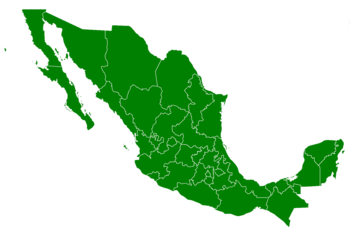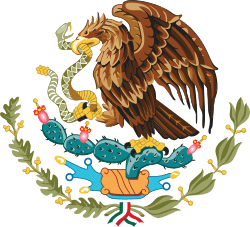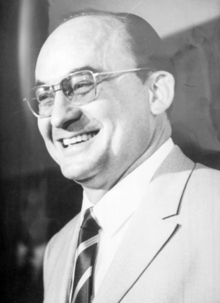1970 Mexican general election
General elections were held in Mexico on 5 July 1970.[1] The presidential elections were won by Luis Echeverría Álvarez, who received 86.0% of the vote. In the Chamber of Deputies election, the Institutional Revolutionary Party won 178 of the 213 seats,[2] as well as winning all 64 seats in the Senate election.[3] Voter turnout in the legislative elections was 64.4%.[4]
| ||||||||||||||||||||
| ||||||||||||||||||||
 The PRI candidate won in all of the states plus the Federal District. | ||||||||||||||||||||
| ||||||||||||||||||||
 |
|---|
| This article is part of a series on the politics and government of Mexico |
|
|
|
|
|
Designation of the PRI presidential candidate
Among the many individuals considered by President Díaz Ordaz to succeed him were Alfonso Corona del Rosal (Head of the Federal District Department), Luis Echeverría Álvarez (Secretary of the Interior) and Emilio Martínez Manatou (Secretary of the Presidency).[5]
According to Jorge G. Castañeda, Díaz Ordaz arrived at a final decision in the aftermath of the 1968 Tlatelolco massacre, in which the Army killed a multitude of unarmed protesters in Mexico City after months of student protests across the country. The massacre was a turning point in Mexican history, and the exact responsibility of the officials involved in it continues to be debated, with many asserting that the Secretary of the Interior, Echeverría, was the one who ordered the troops to shot at the protesters.[6]
With the 1970 elections ahead, Díaz Ordaz "disqualified" both Corona del Rosal and Martínez Manatou from becoming the PRI presidential candidates: in the former's case, because Díaz Ordaz feared that, in the aftermath of the Tlatelolco massacre, Corona del Rosal would be rejected by the population due to his military background; while in the case of Martínez Manatou, he was seen as too close to the dissident sectors that had been behind the 1968 movement.[7]
Therefore, Díaz Ordaz decided on Echeverría, who didn't have a military background but had unmistakably been a loyal hardliner not just during events of 1968, but during the entire Díaz Ordaz administration.
In an extraordinary move, during his annual Address to the Congress on 1 September 1969, Díaz Ordaz assumed the full "personal, ethical, social, judicial, political and historical responsibility" for the government's decisions during the 1968 events[8]. This was interpreted by many as the definitive signal that the President had decided on Echeverría to be his successor, as Díaz Ordaz was assuming complete responsibility for the repression, clearing Echeverría of any culpability. Indeed, two months later, on 8 November 1969 the PRI formally announced that Echeverría would be the party's candidate for the 1970 presidential elections.[9]
Campaign
In addition to being nominated by the PRI, Echeverría was also nominated by the Authentic Party of the Mexican Revolution (PARM) and the Popular Socialist Party (PPS), two traditional PRI satellites. The only opposition candidate in the presidential race was Efraín González Morfín, a former legislator, nominated by the right-wing National Action Party (PAN)
Whereas Echeverría had been a hardliner during the Díaz Ordaz administration, and had been know as a discreet bureaucrat during his entire career, upon becoming the Presidential candidate he radically changed his image, adopting a populist rhetoric towards the peasants and the students; this was likely to shake off the accusations that he had been responsible for the Tlatelolco massacre. As Enrique Krauze puts it, Echeverría became "immediately obsessed with making people forget that he had ever done it."[10]
A confusing incident on November 1969 (shortly after Echeverría was officially nominated as the PRI presidential candidate) provoked a national controversy and almost led to Echeverría being replaced. During a visit to the Universidad Michoacana de San Nicolás de Hidalgo (popularly know as the "Nicolaita University"), Echeverría gave an address that had a mixed reception among the students present. Shortly after finishing the address and as the candidate prepared to leave the building, one of the students shouted demanding everyone present to keep a minute of silence in memory of the students massacred in Tlatelolco. Echeverría and his aides were shocked, and he agreed to keep a minute of silence "for the dead, for both the students and the soldiers who died in Tlatelolco", after which the entire audience, including Echeverría, kept the minute of silence.[11]
The military chiefs, including the Secretary of the Defense Marcelino García Barragán, were outraged by the incident and expressed their indignation to president Díaz Ordaz, stating that the Armed Forces would no longer support Echeverría and demanding that he be replaced as the party's candidate. Nonetheless, Díaz Ordaz stood by Echeverría, who the next day gave an address in which he praised the Armed Forces. In early January of 1970, Echeverría and García Barragán met at the latter's ranch in Autlán to definitely put aside the conflict.[12]
Results
President
| Candidate | Party | Votes | % |
|---|---|---|---|
| Luis Echeverría Álvarez | Institutional Revolutionary Party | 11,970,893 | 86.0 |
| Efraín González Morfín | National Action Party | 1,945,070 | 14.0 |
| Invalid/blank votes | – | ||
| Total | 13,915,963 | 100 | |
| Source: Nohlen | |||
By State
| State | Echeverría Álvarez (PRI + PARM + PPS) |
González Morfín (PAN) |
Unregistered candidates | Null votes | Total | ||||
|---|---|---|---|---|---|---|---|---|---|
| Votes | % | Votes | % | Votes | % | Votes | % | ||
| Aguascalientes | 82,845 | 87.05% | 11,959 | 12.56% | 355 | 0.37% | 0 | 0% | 95.159 |
| Baja California | 207,126 | 73.28% | 72,175 | 25.53% | 374 | 0.13% | 2,945 | 1.04% | 282,620 |
| Baja California Sur | 35,661 | 93.84% | 2,023 | 5.32% | 103 | 0.27% | 211 | 0.55% | 37,998 |
| Campeche | 90,018 | 97.44% | 1,768 | 1.91% | 269 | 0.29% | 323 | 0.34% | 92,378 |
| Chiapas | 442,335 | 98.91% | 4,853 | 1.08% | 0 | 0% | 0 | 0% | 447,188 |
| Chihuahua | 356,852 | 78.33% | 83,120 | 18.24% | 882 | 0.19% | 14,709 | 3.22% | 455,563 |
| Coahuila | 314,547 | 91.09% | 30,350 | 8.78% | 187 | 0.05% | 207 | 0.05% | 345,291 |
| Colima | 49,085 | 90.43% | 5,005 | 9.22% | 10 | 0.01% | 175 | 0.32% | 54,275 |
| Durango | 188,934 | 86.67% | 28,895 | 13.25% | 143 | 6.56% | 0 | 0% | 217,972 |
| Federal District | 1,567,509 | 66.18% | 696,641 | 29.41% | 13,784 | 0.58% | 90,563 | 3.82% | 2,368,497 |
| Guanajuato | 459,328 | 80.74% | 108,938 | 19.15% | 56 | 0.009% | 539 | 0.09% | 568,861 |
| Guerrero | 451,436 | 95.63% | 20,341 | 4.30% | 242 | 0.05% | 0 | 0% | 472,019 |
| Hidalgo | 438,739 | 97.00% | 12,798 | 2.82% | 198 | 0.04% | 561 | 0.12% | 452,296 |
| Jalisco | 804,838 | 81.67% | 167,629 | 17.01% | 1,877 | 0.19% | 11,037 | 1.12% | 985,381 |
| Jalisco | 804,838 | 81.67% | 167,629 | 17.01% | 1,877 | 0.19% | 11,037 | 1.12% | 985,381 |
| Michoacán | 544,176 | 86.25% | 82,909 | 13.14% | 221 | 0.03% | 3,603 | 0.57% | 630,909 |
| Morelos | 163,512 | 90.17% | 17,583 | 9.69% | 22 | 0.01% | 211 | 0.11% | 181,328 |
| Nayarit | 129,067 | 80.03% | 4,686 | 2.90% | 27 | 0.01% | 27,486 | 17.04% | 161,266 |
| Nuevo León | 360,328 | 83.65% | 67,704 | 15.71% | 1,040 | 0.24% | 1,668 | 0.38% | 430,740 |
| Oaxaca | 661,068 | 96.57% | 23,465 | 3.42% | 0 | 0% | 0 | 0% | 684,533 |
| Puebla | 568,028 | 84.76% | 96,313 | 14.37% | 381 | 0.05% | 5,380 | 0.80% | 670,102 |
| Querétaro | 133,480 | 90.35% | 13,620 | 9.21% | 43 | 0.02% | 582 | 0.39% | 147,732 |
| Quintana Roo | 32,069 | 97.86% | 528 | 1.61% | 3 | 0.009% | 167 | 0.50% | 32,767 |
| San Luis Potosí | 331,999 | 90.04% | 35,947 | 9.74% | 126 | 0.03% | 625 | 0.16% | 368,697 |
| Sinaloa | 269,202 | 94.29% | 15,440 | 5.40% | 282 | 0.09% | 572 | 0.20% | 285,486 |
| Sonora | 211,673 | 93.34% | 14,714 | 6.48% | 384 | 0.16% | 0 | 0% | 226,771 |
| State of Mexico | 744,826 | 84,19% | 134,949 | 15.25% | 1,142 | 0.12% | 3,753 | 0.42% | 884,670 |
| Tabasco | 235,763 | 99.01% | 2,355 | 0.98% | 0 | 0% | 0 | 0% | 238,118 |
| Tamaulipas | 374,493 | 91.45% | 34.209 | 8.35% | 285 | 0.06% | 512 | 0.12% | 409,499 |
| Tlaxcala | 117,357 | 93.86% | 7,098 | 5.67% | 90 | 0.07% | 35 | 0.02% | 125,028 |
| Veracruz | 1,068,571 | 90.48% | 84,422 | 7.14% | 252 | 0.02% | 27,668 | 2.34% | 1,180,913 |
| Yucatán | 205,284 | 85.24% | 35,546 | 14.76% | 0 | 0% | 0 | 0% | 240,830 |
| Zacatecas | 261,556 | 90.74% | 26,643 | 9.24% | 37 | 0.01% | 0 | 0% | 288,236 |
| Total | 11,902,153 | 84.63% | 1,944,626 | 13.82% | 22,815 | 0.16% | 193,539 | 1.37% | 14,063,133 |
| Source: CEDE | |||||||||
Senate
| Party | Votes | % | Seats | +/- |
|---|---|---|---|---|
| Institutional Revolutionary Party | 11,154,003 | 84.4 | 60 | 0 |
| National Action Party | 1,889,157 | 14.3 | 0 | 0 |
| Popular Socialist Party | 143,648 | 1.1 | 0 | 0 |
| Authentic Party of the Mexican Revolution | 3,476 | 0.0 | 0 | 0 |
| Non-registered candidates | 33,568 | 0.3 | 0 | 0 |
| Invalid/blank votes | 717,010 | – | – | – |
| Total | 13,940,862 | 100 | 64 | 0 |
| Source: Nohlen | ||||
Note: Four other senators from the governing PRI took their seats in a by-election in 1975 to conclude the 1970-1976 term.
Chamber of Deputies
| Party | Votes | % | Seats | +/- |
|---|---|---|---|---|
| Institutional Revolutionary Party | 11,125,770 | 83.3 | 178 | +1 |
| National Action Party | 1,893,289 | 14.2 | 20 | 0 |
| Popular Socialist Party | 188,854 | 1.4 | 10 | 0 |
| Authentic Party of the Mexican Revolution | 111,883 | 0.8 | 5 | 0 |
| Non-registered candidates | 35,192 | 0.3 | 0 | 0 |
| Invalid/blank votes | 585,874 | – | – | – |
| Total | 13,940,862 | 100 | 213 | +1 |
| Source: Nohlen | ||||
References
- Nohlen, D (2005) Elections in the Americas: A data handbook, Volume I, p453 ISBN 978-0-19-928357-6
- Nohlen, p468
- Nohlen, p470
- Nohlen, p454
- Jorge G. Castañeda, Perpetuating Power: How Mexican Presidents were Chosen. New York: The New Press 2000
- Schmidt, Samuel. "Luis Echeverría" in Encyclopedia of Mexico. Chicago: Fitzroy Dearborn 1997, p. 427.
- Jorge G. Castañeda, Perpetuating Power: How Mexican Presidents were Chosen. New York: The New Press 2000
- "Gustavo Díaz Ordaz asume la culpabilidad de la matanza del 2 de Octubre". Retrieved 23 June 2020.
- Jorge G. Castañeda, Perpetuating Power: How Mexican Presidents were Chosen. New York: The New Press 2000
- Enrique Krauze, Mexico: Biography of Power. New York: HarperCollins 1997, pp. 736-37
- Krauze, Enrique. "Entrevista a Luis Echeverría Álvarez. "Fui leal a las instituciones"". Letras Libres. Retrieved 23 June 2020.
- Castañeda, Jorge G. (1999). La herencia: Arqueología de la sucesión presidencial en México. Penguin Random House Grupo Editorial SA de CV. Retrieved 23 June 2020.

.svg.png)